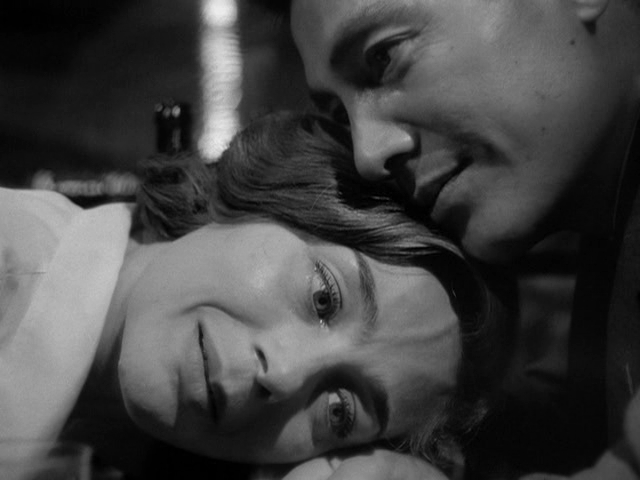
A French actress (Emmanuelle Riva) and a Japanese architect (Eiji Okada) examine their Hiroshima affair in Alain Resnais classic
HIROSHIMA MON AMOUR (Alain Resnais, 1959)
Film Society of Lincoln Center
Friday, October 10, Walter Reade Theater, 6:00
Festival runs September 26 – October 12
212-875-5050
www.filmlinc.com
 In July 1959, Cahiers du cinéma published a roundtable discussion with Eric Rohmer, Jean-Luc Godard, Jacques Rivette, and others about Alain Resnais’s Hiroshima Mon Amour, in which Rohmer said, “Hiroshima is a film about which you can say everything. . . . Perhaps Hiroshima really is a totally new film. . . . I think that, in a few years, in ten, twenty, or thirty years, we shall know whether Hiroshima was the most important film since the war, the first modern film of sound cinema. . . . In any case it is an extremely important film, but it could be that it will even gain stature with years.” Some four and a half decades later, Rohmer’s prediction has come true, as a stunning new 4K digital restoration reveals Hiroshima Mon Amour to indeed be one of the most important films in the history of cinema, redefining just what the medium is capable of, as fresh and innovative today as it was to Rohmer, Godard, Rivette, et al. upon its initial release. As the black-and-white film opens, two naked, twisted bodies merge together in bed, first covered in glittering ashes, then a kind of acid rain. The woman (Emmanuelle Riva) is a French actress who is in Hiroshima to make a movie about peace. He (Eiji Okada) is a Japanese architect, a builder working in a city that has been laid to waste. Both married with children, they engage in a brief but torrid affair; as her film prepares to wrap, she gets ready to leave, but he begs her to stay. Theirs is a romance that could happen only in Hiroshima.
In July 1959, Cahiers du cinéma published a roundtable discussion with Eric Rohmer, Jean-Luc Godard, Jacques Rivette, and others about Alain Resnais’s Hiroshima Mon Amour, in which Rohmer said, “Hiroshima is a film about which you can say everything. . . . Perhaps Hiroshima really is a totally new film. . . . I think that, in a few years, in ten, twenty, or thirty years, we shall know whether Hiroshima was the most important film since the war, the first modern film of sound cinema. . . . In any case it is an extremely important film, but it could be that it will even gain stature with years.” Some four and a half decades later, Rohmer’s prediction has come true, as a stunning new 4K digital restoration reveals Hiroshima Mon Amour to indeed be one of the most important films in the history of cinema, redefining just what the medium is capable of, as fresh and innovative today as it was to Rohmer, Godard, Rivette, et al. upon its initial release. As the black-and-white film opens, two naked, twisted bodies merge together in bed, first covered in glittering ashes, then a kind of acid rain. The woman (Emmanuelle Riva) is a French actress who is in Hiroshima to make a movie about peace. He (Eiji Okada) is a Japanese architect, a builder working in a city that has been laid to waste. Both married with children, they engage in a brief but torrid affair; as her film prepares to wrap, she gets ready to leave, but he begs her to stay. Theirs is a romance that could happen only in Hiroshima.
Director Alain Resnais (Last Year at Marienbad, Same Old Song) was meticulous with every detail of the film, from the casting to Marguerite Duras’s stirringly poetic, Oscar-nominated script and dialogue, from Georges Delerue’s and Giovanni Fusco’s powerful, wide-ranging score to crafting each shot as a work of art in itself, using two cinematographers, Michio Takahashi in Japan and Sacha Vierny in France, to emphasize a critical visual difference between the contemporary scenes in Hiroshima and the woman’s past with a German soldier (Bernard Fresson) in Nevers. Hiroshima Mon Amour is a haunting experience, examining love and loss among the ruins of war as two people, at least temporarily, try to create something new. Riva (Three Colors: Blue, Thomas the Impostor) is mesmerizing as the confused, unpredictable woman, her eyes so often turned away from the man, unwilling to face the future, while Okada (Woman in the Dunes, The Yakuza) can’t keep his eyes off her, desperate for their romance to continue. Riva bookended her long career by starring in two of the most unusual yet beautiful love stories ever made, as more than fifty years after Hiroshima she would be nominated for an Oscar for her hypnotizing performance as an elderly woman debilitated by a stroke in Michael Haneke’s Amour. The glorious restoration of Hiroshima Mon Amour,, supervised by Renato Berta, who was Resnais’s chief cameraman on four projects, makes it, to use the words of Eric Rohmer, feel like a totally new film, like we’re experiencing it for the very first time all over again. Hiroshima Mon Amour is screening October 10 at 6:00 as part of the Revivals section of the 52nd New York Film Festival in advance of its October 17 opening at Film Forum and the Elinor Bunin Munroe Film Center. Resnais, who passed away on March 1 at the age of ninety-one, is also represented at the New York Film Festival with his final work, Life of Riley. In addition, the Film Society of Lincoln Center will host the series “By Marguerite Duras” October 15-22.